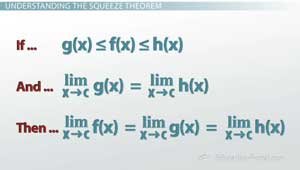
Sitting in a sparsely filled stale classroom, Johnny is listening to his teacher define the parameters of the squeeze theorem. “…therefore, the limit as x approaches c of f of x…” His eyes dart to the window where some kids are playing soccer outside while his teacher slowly finishes describing the theorem he has already written on the board.

Johnny has always loved math since he was a boy. The simplicity, the purity, the logic – it all just makes sense to him and has always come so easily for him.
As Johnny looks at the notation his teacher is writing on the board, he thinks to himself, this is so obvious, why is this a theorem in calculus? I wonder what practical applications this has or if someone actually uses it in an industry. Since this is so easy for me, maybe there is a job I could do someday that uses it.
He raises his hand. His teacher glances in his direction and raises an eyebrow at him as if to say, why are you interrupting me, I am going to tell you everything you need to know. Seeing that Johnny is not going to lower his hand, the teacher nods in his direction. Johnny asks, “So obviously if something is between two other things and the two other things are equal then that original something is equal, too.” The teacher shifts his eyes to the clock and back to Johnny, but Johnny continues, “Is there some practical application of this?”
Of course, thinks the teacher, they always have to know how it applies to their life otherwise they don’t care about the math. What an annoying generation.
“Well, Johnny, think of it like this: if Sally always gets an equal or better grade than Joey and an equal or worse grade than Billy; and if Joey and Billy both got a C on their test, then what did Sally get? A C.”

While the teacher turns back to the board to continue with his lesson and examples, happy that Johnny didn’t cause too long of a disruption in his presentation, Johnny slinks down in his chair. Seriously? He thinks. I already understood the ridiculously easy premise of the theorem. He sighs and begins completing his homework problems in his notebook.
In this story, it is easy to look down on the teacher. But think about where the teacher came from. He went through school, loving the logic of math and then pursued a mathematics education degree in college. He aced Calc 1, 2, and 3 and differential equations were a breeze. Graduating on top of the world, he entered the education field. He never learned the applications of the theorems he studied. He never heard about the multitude of industries that utilize higher level math on a daily basis. He has no library of knowledge to pull from when curious students ask these “why”s of math.
In his day, he was given one of three options as a math major by his professors:
- Actuary (well, only if you are good at stats, and he wasn’t)
- Accountant (but that was boring)
- Mathematician (that’s only for super smart people, right?)
So who is really to blame for this teacher’s half-hearted unhelpful answer to Johnny’s question? The teacher? Maybe. But I think it is more than that.
I am a math teacher. I majored in math in college and tacked on education in my last year. I never had to take an applied math course (as a pure math major or as a math education major). There are universities that require an applied math course, but many have you choose one or two courses from various topics: actuarial science, computer science, classic mechanics, economics, fluid mechanics, etc. None of these actually help a teacher understand how and why the many theorems and postulates in math are used in a variety of current industries.

In order to fix the above systemic problem of mathematics in school and inspire young minds to pursue mathematical careers (other than a math teacher), I think a 400 level survey course of applied mathematics that explores various industries and examples of how higher level math is actually used in those industries, should be required for all math education majors.
How do you think we can bridge the gap so that teachers are equipped to illuminate the possibilities of math for aspiring students to fill this in demand field in our modern workplace, especially as America is lagging behind?
A comprehensive approach would include alumni coming back to campus regularly as guest speakers, followed by long-term alumni mentoring, followed by shadowing and internships. Not just for those motivated to seek out the extracurricular opportunities, but as a normal part of education for every student.
Downvoting a post can decrease pending rewards and make it less visible. Common reasons:
Submit
Love it! Hearing about what people are doing in their fields and how they are using the math is invaluable.
Downvoting a post can decrease pending rewards and make it less visible. Common reasons:
Submit
Well, then, here's a concrete example. http://www.stemeast.org
Downvoting a post can decrease pending rewards and make it less visible. Common reasons:
Submit
Damn I used to hate math so much in high school, and now I use it every day to make money. I used high level math in the past to trade stocks and I use it now too.
People sometimes underestimate the usefulness of certain things.
Downvoting a post can decrease pending rewards and make it less visible. Common reasons:
Submit
I totally agree with your last line! I'm curious what you do now that uses it. Thanks for your comment.
Downvoting a post can decrease pending rewards and make it less visible. Common reasons:
Submit
Probability theory, statistics and econometrics. It is very useful when one wants to understand the economy and markets and make some money.
Downvoting a post can decrease pending rewards and make it less visible. Common reasons:
Submit
Easy to teach but how to make it fun is the real challenge for math teachers, i think. Once in a while, math teachers may also need to upgrade themselves.
Downvoting a post can decrease pending rewards and make it less visible. Common reasons:
Submit
I think part of making it "fun," especially in the higher level classes, is showing the kids what they could do with it in their lives. Including more perspectives like @profitgenerator would help.
Downvoting a post can decrease pending rewards and make it less visible. Common reasons:
Submit
Yes, I know @profitgenerator work. Followed him.
Downvoting a post can decrease pending rewards and make it less visible. Common reasons:
Submit
The new generation of students has really problems to connect what they learn to everyday life. That's true for math, but also for physics (now physics is qualitative at high school and corresponds to an ideal world that is not the reality...)
It is important to make connections!
Downvoting a post can decrease pending rewards and make it less visible. Common reasons:
Submit
I also run across the "perfect world" problem. At that stage (before they can understand adding various parameters or restraints to the problems) I usually just try to make it funny. It is so important to always have them thinking about the logic of the problems. One time I was teaching systems of inequalities and an example problem in the book was about postage stamps and prices. I asked the kids what they would do if they actually had to pay the postage and figure this out. One responded that he would draw the system on graph paper, shade, find the overlapping region, etc. I said, "Really? You are actually going to take some graph paper and a pencil to the post office to figure out how much to buy?" He chuckled along with the other kids, but the point is clear: getting the students to actually connect mathematical situations to their reality is tough!
Downvoting a post can decrease pending rewards and make it less visible. Common reasons:
Submit
Among funny stories, I once got one student who computed the speed of a car (normal car, nothing special here) as 500 km/h. I asked him his opinion about that number. And his answer was "it 's physics after all, everything is possible". I was chocked at that time (but I was also a 22 year-old assistant back then) ^^
Downvoting a post can decrease pending rewards and make it less visible. Common reasons:
Submit
That's so funny! Clearly, the sense of numbers and hence they can't really tell if it is logical or not. Maybe your student can't or don't drive a car yet?
Wonderful rebuttal.... haha
Downvoting a post can decrease pending rewards and make it less visible. Common reasons:
Submit
I have other examples. The point is that students are not connecting physics to real life anymore.
Downvoting a post can decrease pending rewards and make it less visible. Common reasons:
Submit
Good example - and totally agree with your point.
Downvoting a post can decrease pending rewards and make it less visible. Common reasons:
Submit
Pure mathematics exists to study abstract concepts with no consideration given to their practical applications. Applied mathematicians and scientists in a wide variety of disciplines then draw on the discoveries of the pure mathematicians and apply them to their own particular areas of expertise. There is no pressing need for teachers to justify and demonstrate to students how mathematics can be useful in the "real world". Quite the opposite, teachers should convey to their students that pure mathematics is at the heart of mathematics. It is a sublime and purely mental world that is not tied to the physical world in any way. To focus on the usefulness of mathematics is to mar this intrinsic beauty. Sure, prime numbers are used in cryptography but prime numbers have always fascinated the greatest mathematicians. The problem faced by students in high school mathematics is that this sense of wonder and fascination in mathematical concepts like prime numbers is missing. It's often lacking in their teachers in the first place.
Downvoting a post can decrease pending rewards and make it less visible. Common reasons:
Submit
I agree, pure mathematics is beautiful. When I was a young kid, I loved trying to figure out patterns in operations with numbers - just for the fun of it. That is definitely a huge part of it and teaching pure mathematics is essential! Don't get me wrong, I totally agree with that. But, I think there needs to be a better crossover to applied mathematics. Not every kid that loves math should be a mathematician. Our country is sorely lacking in people to work in various industries that are math based, such as engineering. How can we better prepare students for those industries or even just make students aware of the existence of the use of higher level math in those industries and highlight them as possible career paths?
Downvoting a post can decrease pending rewards and make it less visible. Common reasons:
Submit
I think the reality is that we do not design school to educate young minds, but to house children. I fought this in my own teaching and largely failed in many respects. In the age of high stakes testing, teaching passion is a no-no. In the end I decided to focus on logic and rational thought. Teaching government, geography and world history made it a bit difficult, but I figured it out though I am not sure I succeeded. Very interesting article.
Downvoting a post can decrease pending rewards and make it less visible. Common reasons:
Submit
As a high school mathematics teacher, I experience the highs and lows of math education on a daily basis. It's not all smiles and rainbows in high school math class it is still challenging to teach mathematics to high school students. You can get Affordable Orlando Movers for stress-free traveling. But there are some things that I find make teaching my students rewarding:
Downvoting a post can decrease pending rewards and make it less visible. Common reasons:
Submit
I'm a high school math teacher and I know how hard it is to teach a subject that requires so much memorization, especially when you are trying to help your students reach their educational goals. Here you check this https://taurangaconcrete.co.nz/ and get more new skills for roof pavings. But enough of the fluffy stuff. Here are real confessions of someone who has to deal with this on a daily basis. Feel free to use them as needed.
Downvoting a post can decrease pending rewards and make it less visible. Common reasons:
Submit
Confessions of a high school math teacher. Confessions of a high school math teacher who, as it turns out, was completely wrong about the nature of mathematical thought. So you can check https://thesmallbusinessblog.net/how-to-write-a-marketing-cv/ for the new latest tips for writing. Confessions of someone who's learned that insanity is doing the same thing over and over again yet expecting different results.
Downvoting a post can decrease pending rewards and make it less visible. Common reasons:
Submit